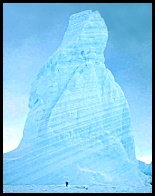
 Layer Upon Layer Upon Layer... Icebergs are not frozen sea water. They form when the edge of a glacier reaches the sea and the ice breaks off in huge chunks and floats away. Glacial ice is made up of snow that has fallen over thousands of years. The stripes and different colored layers in the ice (that become more apparent when it is split into icebergs) represent different periods of snowfall. The layers can tell us about the weather conditions under which the snow fell. If it was very cold, then a light open layer of snow would fall, trapping air within the ice crystals. This creates a paler or white layer. The darker, bluer layers come from snow that fell in relatively warm (maybe even wet) conditions, when little or no air was trapped in the snow. The weight of the snow build-up turns the snow in the lower layers to ice, both compressing the layers and the air trapped within them. When the ice enters the water as an iceberg, this air is released as the berg melts - often creating popping or hissing sounds. PICTURE: Ice layers in an iceberg that is frozen in sea ice. Yes, that little spot at the bottom is a person, and keep in mind that about 85% of that berg is below the waterline!
Iceberg: Library and Links Glacier: Library and Links Snow: Library Drilling for... ice? Iceberg Map |

|
DICTIONARY: Just "double-click" any unlinked word on this page for the definition from Merriam-Webster's Student Electronic Dictionary at Word Central. |

|
ARCTIC LIBRARY & GLOSSARY: Check this section for an index of the rest of the things you really need to know about the Arctic. |

|
ARCTIC MAPS & WEATHER REPORTS: Maps of the Northwest Passage, explorers' routes, iceberg sources, Nunavut, the Arctic by treeline, temperature... |

|
ARCTIC LINKS: Even more information! Links to sites related to the Arctic and "Iceberg: the Story of the Throps and the Squallhoots". |

|
GUIDE TO ARCTIC SUNRISE & SUNSET: How much sunlight or darkness is there in the Arctic on each day of the year? |
|
Search for more on this topic...from Athropolis! Select the search engine (up to 4 at one time), enter your request, and click "Search". ( Search Tips ) |
to is the property of their respective owners, and Athropolis is not responsible for their content.